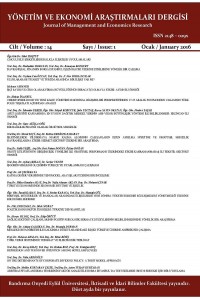POLITICAL BUSINESS CYCLES THEORIES: EVIDENCE FROM TURKEY1
Öz
The studies that have been conducted in recent years suggest that incumbent governments manipulate the economy for political reasons, in particular, with the aim of re-election. In new political economy literature, this situation is known as the Political Business Cycle; a macroeconomic cycle induced by the political cycle. The theory of PBC is studied under four theories called “The Traditional Opportunistic PBC Theory”, “The Traditional Partisan PBC Theory”, “The Rational Opportunistic PBC Theory” and “The Rational Partisan PBC Theory”. From these theories, the assumptions of the “The Rational Opportunistic PBC Theory”, “The Traditional Partisan PBC Theory” and “The Rational Partisan PBC Theory” do not seem to be valid in the Turkish context; hence testing of these models would not be meaningful. Therefore, in this study, “The Traditional Opportunistic PBC Model” is examined. In the study, the quarterly series of GDP, inflation, money in circulation (M0), money supply (M1) for the period of 1987- 2012 are analyzed with “Seasonal BoxJenkins Models”. According to the results obtained from this study, political business cycles hasn’t been observed in any series. This means that The Traditional Opportunistic PBC Theory isn’t valid for Turkish context.
POLİTİK KONJONKTÜR TEORİLERİ: TÜRKİYE’DEN KANITLAR
Öz
Son dönemlerde yapılan çalışmalar iktidarların politik nedenlerle özellikle de yeniden seçilebilmek amacıyla ekonomiyi manipüle ettiklerini belirtmektedirler. Yeni politik iktisat literatüründe bu durum politik dalgalanmalar tarafından yaratılan makroekonomik dalgalanmalar, bir diğer deyişle “Politik Konjonktür Teorileri” olarak adlandırılmaktadır. Politik Konjonkür Teorileri “Geleneksel Fırsatçı Politik Konjonktür Teorisi”, “Geleneksel Partizan Politik Konjonktür Teorisi”, “Rasyonel Fırsatçı Politik Konjonktür Teorisi” ve “Rasyonel Partizan Politik Konjonktür Teorisi” olarak dört farklı teori ile incelenmektedir. Bu modellerden “Geleneksel Partizan Politik Konjonktür Teorisi”, “Rasyonel Fırsatçı Politik Konjonktür Teorisi” ve “Rasyonel Partizan Politik Konjonktür Teorisinin” varsayımları Türkiye için uygun olmadığından bu çalışmada “Geleneksel Fırsatçı Politik Konjonktür Teorisi” test edilmiştir. Çalışmada 1987- 2012 dönemi için çeyrek yıllık GDP, enflasyon, dolaşımdaki para (M0), para arzı (M1) serileri Mevsimsel Box-Jenkings Modelleri ile analiz edilmiştir. Elde edilen sonuçlara göre ilgili dönemde hiçbir seride politik konjonktür dalgalanmaları gözlenmemiştir. Bu bulguyu Geleneksel Fırsatçı Politik Konjonktür Teorisi’nin Türkiye için geçerli olmadığı şeklinde yorumlamak mümkündür.
Ayrıntılar
| Birincil Dil | İngilizce |
|---|---|
| Bölüm | Makaleler |
| Yazarlar | |
| Yayımlanma Tarihi | 27 Ocak 2016 |
| Yayımlandığı Sayı | Yıl 2016 Cilt: 14 Sayı: 1 |

